Search
Did you mean: Deir el-Medina?
Search Results
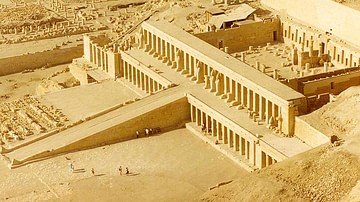
Image
Temple of Hatshepsut, Aerial View
The Temple of Queen Hatshepsut of Egypt at Deir al-Bahri, Thebes, Egypt
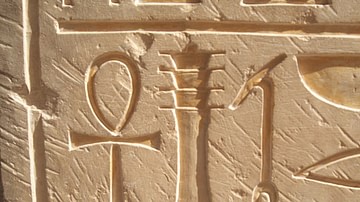
Image
Ankh, Djed & Was
Relief showing an ankh (symbol of life), djed (symbol of stability), and was (symbol of power) from the tomb of Hatshepsut's mortuary temple at Deir al-Bahri, Egypt.
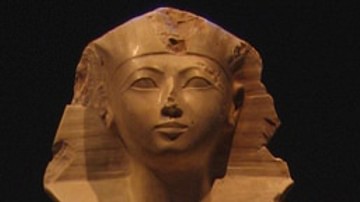
Image
Hatshepsut
Detail of Hatshepsut, Eighteenth dynasty of Egypt, c. 1473-1458 B.C. Indurated limestone sculpture at the Metropolitan Museum of Art, New York City. Hatshepsut is depicted in the clothing of a male king though with a feminine form. Inscriptions...
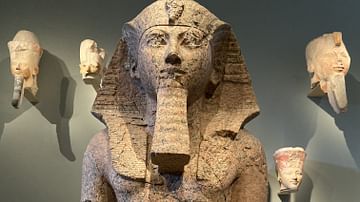
Image
Kneeling Statue of Hatshepsut
This is a large, kneeling statue of Hatshepsut that was found during excavations of her temple at Deir el-Bahri. In this statue, Hatshepsut is depicted wearing the nemes headcloth, a false beard on her chin, andis kneeling with a nemset jar...
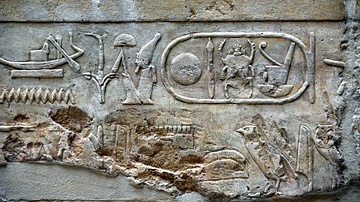
Image
Prenomen of Thutmose II
This is a detail of a large limestone relief (showing a boat trip) that came from the Mortuary Temple of Hatshepsut at Deir el-Bahari, Egypt. The throne name (prenomen) cartouche of the Egyptian pharaoh Thutmose II (regined 1493–1479 BCE...
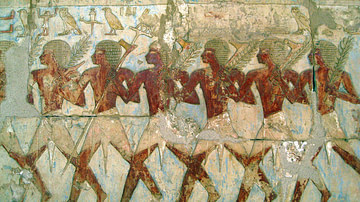
Image
Egyptian Soldiers
Egyptian soldiers carrying axes and branches. A relief from the tomb of Hatshepsut depicting the expedition to the Land of Punt (1493 BCE), Deir El-Bahri.
![Pyramidion of Ramose [Detail]](https://www.worldhistory.org/img/c/p/360x202/3690.jpg?v=1741821666)
Image
Pyramidion of Ramose [Detail]
The limestone Pyramidion of Ramose, from the top of the tomb of the 'Necropolis Scribe'. Scenes on all four sides depict the worship of the sun. From Deir-el-Demina, New Kingdom, XIX Dynasty, 1279-1213 BCE. (Egyptian Museum, Turin)
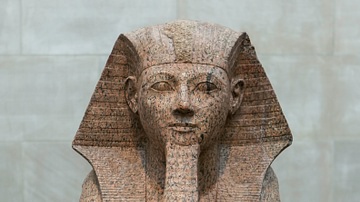
Image
Sphinx of Hatshepsut
Sphinx of Hatshepsut (ca. 1479–1458 BCE). This colossal sphinx portrays the female pharaoh Hatshepsut with the body of a lion and a human head wearing a nemes–headcloth and false beard. The sculptor has carefully observed the powerful muscles...
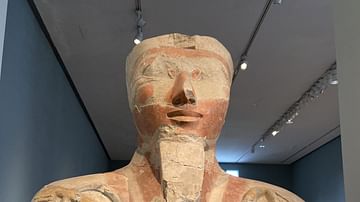
Image
Osiride Statue of Hatshepsut
This is a bust of Pharaoh Hatshepsut, in the form of Osiris (Osiride). The statue originally stood over 4.6 m (15 ft) high and is originally from Hatshepsut's mortuary temple at Deir el-Bahri. This statue was not a free-standing statue -...
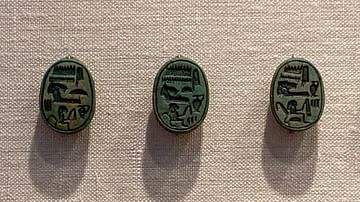
Image
Scarabs of Hatshepsut
Scarabs of Hatshepsut (r. 1479-1458 BCE), 18th Dynasty, New Kingdom of Egypt. Metropolitan Museum of Art, New York. The Metropolitan Museum of Art was an integral part of the excavations of Hatshepsut's temple at Deir al-Bahri. During the...